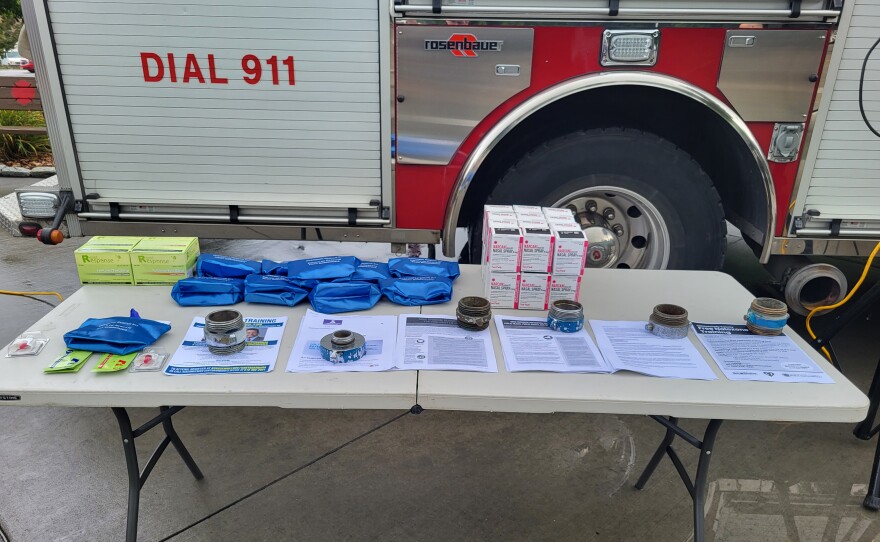Capital Region officials are ramping up prevention and awareness efforts as drug overdoses rise in the area.
Officials such as Schenectady Fire Chief Donald Mareno say the Capital Region’s drug overdose situation has gotten worse by the introduction of fentanyl and xylazine, also known as tranq.
“The numbers are staggering. Last year there were in Schenectady, city of Schenectady, overdoses over 250. But when you look at the whole picture of overdoses, and you include alcohol as an issue also, it's nearly 400. And this year, the numbers are trending upwards from there,” Mareno said.
Schenectady Police Chief Eric Clifford says his department has revised its approach to drug involvement.
“With high praise to Lieutenant [Ryan] Macherone, who's in the audience with us today, we started speaking about this very topic and he brought in some key partners throughout the county to help us create a nonarrest pathway for those who use and support Harm Reduction Strategy, becoming a focal point of our research,” Clifford said.
But, Clifford says efforts are still coming up short.
“We're not winning the battle right now. So we need to put more resources into it,” Clifford said.
Clifford says treatment alone isn’t enough.
“We have to reduce the demand, get individuals who use these substances help. But we also have to go after the supply, those that are bringing these drugs into our community, we have to significantly reduce them and make the penalty so severe that nobody's gonna want to go into that line of business,” Clifford said.
Fire Chief Mareno says his department is prepared to treat those who overdose since every department member is a paramedic.
“We want to put a face to the issue. It's just not a number, someone that has a substance abuse issue. They're not a number, they're a real person. They're your next door neighbor, they're your mother, your dad, your brother, the person you see in church. It affects everybody. No one is immune to this,” Mareno said.
Phil Barrett, the Republican Clifton Park Supervisor and chair of Saratoga County’s Health and Human Services Committee, says New York’s fastest growing county is tackling the issue head-on.
“We have an overdose dashboard that we established months ago that provides public information so people can understand the extent of the overdose situation throughout the county. We have had instances in various parts of the county where there will be a large number of overdoses in a very short period of time, we immediately respond as a Department of Health. We set up Narcan training and distribution events,” Barrett said.
Barrett says there have also been outreach efforts.
“One thing we did over a year ago was meet with families that had lost loved ones, or have loved ones struggling with drug addiction. And we ask them for their insights and what they believe our priorities should be as we continue this battle,” Barrett said.
Barrett says youth prevention efforts are also underway.
“In the next several months as school opens, our SROs, who work within our schools, we'll be working closely with some new human resources will be bringing to the table for our school districts,” Barrett said.
Joseph Filippone of Project Safe Point in Albany says his organization’s services are widely available.
“While we're based out of Albany, we have offices in Schenectady, an office out of Schuylerville. But we provide services in an array of different ways to those 14 counties. So as far west as Delaware, Schoharie, Otsego, Fulton, Montgomery, Saratoga, Warren, Washington for some of our services, Rensselaer, Columbia, Greene,” Filippone said.
Filippone says Project Safe Point meets people where they are.
“Part of our work with people who are using drugs is looking at what is the person who's using drugs need? Do they need access to sort of the treatment services we're offering here? Absolutely. You can do it through telehealth or you can do it- we make it as easy as humanly possible for people,” Filippone said.
Filippone says Project Safe Point isn’t going to judge.
“I'm gonna say, do you consider your substance use a problem? It’s one of the first questions we ask people when they- like, one, do you want to make behavioral changes, and two, Do you consider your substance use problematic, like, if you don't consider your substance use problematic, I'm not gonna sit here and try to convince you that your substance use is problematic. Why would you want to come back to me if that's what you're gonna get?” Filippone said.
Filippone says treatment services aim to address issues behind drug use as well.
“Do you want to look at housing options, because that might alleviate, right, like a lot of mental health, like, a lot of these things are, are sort of stimulus-oriented, if you remove that sort of, people feel less depressed, people less anxious, like, you know, less fearful,” Filippone said.
Project Safe Point also offers syringe exchanges and hepatitis C treatment services.
The Saratoga County Health Department recently installed naloxone stations, which are designed to reverse opioid overdoses, at the Saratoga Performing Arts Center. There are also stations in Albany, Rensselaer and Schenectady counties.




